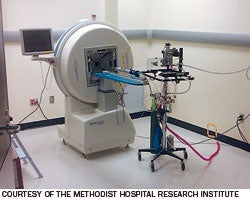Imaging suite gets the jump on infectious diseases
 |
| New imaging suite holds promise for identifying infectious diseases. |
Scientists at The Methodist Hospital Research Institute in Houston are in the early stages of deploying a unique imaging suite designed to help pinpoint the start and cause of highly infectious diseases.
Researchers believe the initiative — part of a collaboration with Philips Healthcare — will help them more quickly diagnose patients without exposing caregivers to infectious agents. The suite will be useful for diagnosing all types of infectious diseases but could prove invaluable in acts of bioterrorism or a pandemic.
"The ability to have imaging suites that can handle high-level infectious agents allows us to be more prepared in the community for these types of events and, more importantly, allows us to study ways to deal with their consequences," says King Li, M.D., radiology chair at the institute and the project's leader.
Airtight containment vessels that can accommodate life-support systems will make it possible for tissue samples and infected research models to be imaged rapidly without risk of exposure to other patients, researchers or staff. The suite will be used to study pathogens that require biosafety Level 3 containment, including bacteria that cause tuberculosis.
The double-shell containment vessel will keep the subjects — initially microorganisms, later animal subjects and eventually human patients — isolated from the unexposed space around it.
Li says that the technology will provide a deeper and more rapid assessment than traditional methods for patients suspected of having highly infectious diseases.




